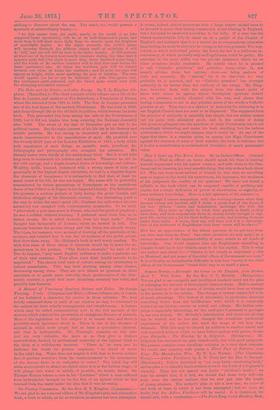How I Spent my Two Years' Leave. By an Indian
Officer. (Samuel Tinsley.)—That an officer on leave should spend his time in making himself acquainted with his native country, and with visits to the Con- tinent and to America, is a very sensible thing. But why write a book about it? Who can those most unkind of friends be who urge an unwilling man to expose to the world his narrowness, his ignorance, the weakness of his judgment, the crudity of his opinions ? We have not found a syllable in the book which can be supposed capable of profiting any reader, not a single indication of power of observation, or sagacity, or even ordinary knowledge. Here is a fair specimen of his manner:—
" Although I cannot sympathise with the working-classes when they become violent and insolent, still I think a great deal of the blame of the late strikes," union and indignation meetings,' lies with the masters. They have no right to work their people to death as they have done, and then remunerate them in money barely enough to sup- port life, caring not a jot for their bodies or souls, and treating them no better than cattle. A worm, they say, will turn, and it is a character- istic of the nobleness of Englishmen that they 'never will be slaves."
How fine an appreciation of the labour question do we got hero from our wise man from the East! One other quotation we may make, as a curious instance of the impenetrability of some minds to all kinds of knowledge. One would suppose that any Englishman travelling in Canada would know how Ottawa came to be the capital. This is what our author says about it:—" Ottawa is not nearly so important a city as Montreal, and yet many of the chief offices of Government are here." It is evidently an inexplicable difficulty to him how "many of the chief offices of the Government" found their way to so small a place.


































 Previous page
Previous page